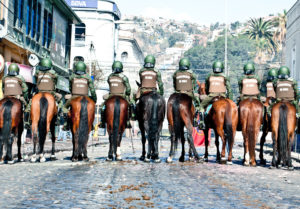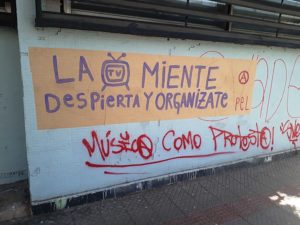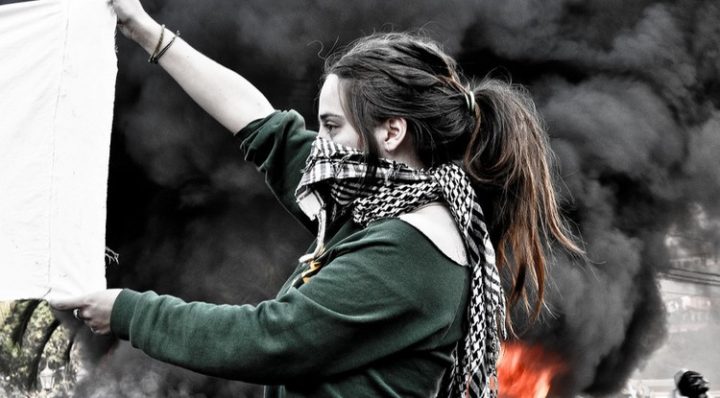Americans-Need-To-Rebel-Like-Chileans:Confiscate-Bill-Gates-Vaccine-Frauds-To-Give-To-His-Victims,i.e,-US!
MODEL-OF-HOW-THEYT-SHOULD-GOVERN-IN-THE-NEW-DEPRESSION-OF-THEIR-OWN-AKING-OR_ELSE-!
Franck Gaudichaud* returned a few weeks ago from a stay in Chile and gave us an interview to talk about more than six months of social unrest that shook the country.
The Chilean uprising began in October 2019 and spread like wildfire in the student movement after the Piñera government’s decision to raise the price of subway tickets. The repression of Chile’s youth ended up mobilizing all of society, no longer against the increase in transportation prices, but against the whole neoliberal system inherited from the Pinochet dictatorship.
On October 22, when a dozen people had already been killed and more than 80 injured–some of them shot by the Carabineros (Chilean national police) –while acts of torture and sexual aggression were being committed by the military patrolling in Santiago, President Sebastián Piñera publicly apologized to the Chilean people. And he announced social measures aimed at “calming” the anger of the insurgents: an increase in the minimum wage, a 20% increase in the lowest retirement pensions, the cancellation of the recent 9.2% increase in electricity rates, the creation of a new tax bracket for those with incomes over 8 million pesos per month ($9,600 USD), a reduction in the salaries of parliamentarians, etc.
In addition, on October 24, the Chamber of Deputies voted (88 votes in favor, 24 against, and 27 abstentions) on a bill to shorten the working week from a maximum of 45 hours to 40 hours. The proposal will have to go through a committee and then through the Senate.
Jérôme Duval: There has been a change in the government’s attitude that seems, at first glance, substantial. Why haven’t these announcements calmed the rebellion?
Franck Gaudichaud: In reality, the so-called “social agenda” has been completely forgotten by the government. Announcements have been made, even a government website has been created showing the progress being made, as if we would have reached 77% of the realization of this social program. If we look at the details, most of the measures have not yet been implemented, and even less so now in the context of a global pandemic and when a health catastrophe is looming, in a context of a health system devastated by decades of neoliberalism. Even when some social measures are implemented, such as a slight increase in the minimum old-age pension, bonuses for lower salaries or small improvements in health coverage, the logic remains neoliberal, i.e. that the state, with public money, comes to “help” and support the market in education, health, or pension funds. Furthermore, what the government is announcing is really the minimum and it’s quite pitiful. There could have been some progress with the announcement of taxes on the rich, but nothing: Piñera, who is part of the financial oligarchy, is completely controlled by big business and has no intention of taxing the ruling class. As for a far-reaching program of social reforms, the most developed proposal to date is that of the “Mesa de Unidad Social” (Social Unity Roundtable), which included the CUT (Unitary Workers’ Central), several unions and many other organizations (feminists and environmentalists in particular), until it broke down in recent weeks. It is a 10-point proposal to which the government has not responded.
There is violent repression from the Carabineros and, at the same time, the judicial system is passing laws that destroy the freedom to stop the mobilization. Is the most recent law adopted to prohibit the use of masks during demonstrations an illustration of this?
In fact, from the beginning of the movement, the government’s response was repression, a really fierce state repression with the military in the streets, and the systematic use of lead bullets by the Carabineros. Today, Chile is denounced internationally, but also within the country by the National Institute of Human Rights, which is a state institution. It counts more than thirty deaths, almost 400 eye mutilations and several thousand injured, including hundreds by lead bullets. There have also been cases of torture and rape in police stations and there are reports of thousands of people who have been in prison for months, considered by the demonstrators to be political prisoners: there are currently more than 2,000 of these political prisoners still in prison, at a time when the coronavirus threatens to destroy thousands of lives, and particularly in prisons. And the response of Parliament was to intensify this repression with a recently passed law, including by the parliamentary left and the opposition, which criminalizes social struggle. Today, people can go to jail because they have set up a roadblock and prevented traffic, or because they wear a hood during a demonstration.

There is a strong protest movement against the pension model, against privatized pension funds. What is its impact, and can we say that it finds echoes in France with the movement against the pension bill?
Among the accumulated experience of social mobilizations in recent years is the mass movement “No + AFP”, which basically means “we don’t want any more pension funds”. This struggle has succeeded in demonstrating a massive rejection of this capitalization system by the population, simply because Chile’s pension payout rate is one of the lowest in the world. Some workers who have worked all their lives find themselves retired with less than 20% of their last salary. Although half of all workers earn less than $500 USD “net” per month… This is a practical demonstration of the total failure of the funded system. Chile is the country with the greatest neoliberal experience in the world (since 1975) and is one of the most radical. Private pensions were brutally introduced under the dictatorship by Sebastian Piñera’s brother, José Piñera, who was Pinochet’s minister. At the height of the dictatorship, everyone had to go through this violent reform… except the military, who kept their system of contributions. In opinion polls, the demand to end the private pensions system, or to reform it, comes first, after the demand for a new Constitution. If we want to understand why the capitalization system and the privatization of our pensions is dramatic, we have to look at the catastrophic results of the Chilean experience. Therefore, this also has a direct relationship with the mobilizations of recent months in France, as we can see that the unions, the French workers, were resisting the reform of the Macron government and the project of a “points” based system that – in the long run – will facilitate the introduction of capitalization and private pension funds of the “Black Rock” type and others.
Another central demand of the people’s movement calls for a change in the Constitution inherited from Pinochet. On November 15, 2019, the parties represented in Parliament signed an “Agreement for Social Peace and a New Constitution. This initiative proposed a vote for April 26th, during which voters will be asked to answer two questions. The first, “Do you want a new constitution?” will be followed by a second asking voters to choose between a “constitutional convention” composed exclusively of members of civil society and a “mixed assembly”, including citizens and parliamentarians. Which option do we go for? Could this process proposed by the government divert attention and be a way to calm the fervor in the streets?
The Agreement for Social Peace and a new Constitution was negotiated in Parliament just after the second major national strike that marked this round of mobilization, in late November 2019. This agreement seeks, as its title indicates, “social peace”, thus calming and channeling the popular rebellion in streets facing big business who feared a blockade of the economy. The agreement was also obtained under pressure from the military, as rumors have circulated that, without an agreement at the parliamentary level, a coup d’état could take place. Among the signatories are, of course, the right, the center and even some representatives of the Frente Amplio (the “new” left). It is therefore a question of trying to put an end to the popular mobilization and at the same time to integrate in part the main demand of those mobilized: a new constitution. In a sense, this is a victory for the mobilizations “from below” because, for the first time, the Chilean political elite recognizes the need to change the Constitution inherited from Pinochet in 1980. But the agreement provides ample room so that they can try to control this process.
In April, if the pandemic allows, which is very unlikely (1), the vote should result in a “yes” to a new constitution and a constitutional convention, in other words the most “progressive” of the options proposed by the parliamentary agreement. But it is a “constitutional convention” in which the “old” parties in power for thirty years since 1990 want to keep control of the process of change, and in which there is no guarantee that the independent lists of citizens can be kept in the convention until the end. Negotiations are still under way on the representation of indigenous peoples, which some on the right do not want, and on gender parity, as this was not included in the initial agreement. Above all, the right tried to shut down the constitutional discussion and has imposed a two-thirds majority to approve each article of the future Magna Carta, while another sector of conservative parliamentarians rejects all together any prospect of changing Pinochet’s Constitution. This does not mean that the left should refrain from intervening in this future referendum: large sectors of the social and political left (including libertarian sectors) intend to break into this space of domination, and try to facilitate a constitutional opening of the system and to destabilize the strategy of control “from above” of the government to achieve a true democratic constituent process, or at least put central issues on the table, like an end to the privatization of water, education, and health. It also aims to put forward new political rights, for example, recognition of the rights of self-determination of the Mapuche people or the renationalization of copper. Other sectors of the left and of popular assemblies, for their part, are calling for an active boycott of the referendum to denounce what they see as a new electoral charade and a “rehash” of the “consensus” democracy agreed upon by the dominant classes, which has existed since the 1990 transition. Both sides have arguments for and against.

Texte photo : La télévision ment. Réveille-toi et organise-toi.
The constituent process is a central theme of the citizens’ assemblies, sometimes called cabildos, that have flourished throughout the country. How do these assemblies function and is there any coordination?
One of the most interesting self-managed and democratic aspects of the movement is, in fact, these territorial and neighborhood assemblies. There was a small debate between “cabildos” and “assemblies”, since the “cabildos” were often convened by parties or constituted forces and the “assemblies” by people not belonging to a political-social organization. However, today this debate seems to me to be obsolete. There are dozens of assemblies in Santiago and in several other cities in the country, such as Antofagasta or Concepción. These are moments of collective elaboration, of debate about what kind of society to build, what kind of constitution, what kind of economic model, of health or education, but also how to protect oneself against repression, or sometimes the looting of shops and stores, etc.
The strength of this movement is its territorial anchorage and its horizontality. While most unions remain weakened and the main political parties are totally discredited, there is strong politicization “from below”, especially when the assemblies are well structured. During the last two weeks there have been attempts to coordinate in Santiago around twenty-five territorial assemblies or organizations that try to give a clearly anti-neoliberal, feminist and democratic perspective to these struggles. This is very clear in their speeches and forms of deliberations. Obviously, now with COVID-19 everything is more or less paralyzed, but contacts and solidarity networks already exist, and this is fundamental.
A few weeks back, there were murders of football fans, including Jorge Mora, who was dragged away by a police truck, and Ariel Moreno Molina, 24 years old, who was shot dead during a protest over Mora’s death. It seems that the social movement is reviving. What do you think?
During the Christmas holidays, the summer holidays in Chile, there has been a drop in protests, although every Friday in the “Plaza de la Dignidad”, as it has been renamed, there was a demonstration and confrontations with the Carabineros. In a way, it’s a Chilean-style ‘yellow vest’ movement! Until the health crisis and the pandemic arrived, other mobilizations continued, such as that of the young students of middle and high school who have been very active in recent weeks. They have boycotted the “PSU”, an elitist and very unequal university entrance exam.
But the repression also continues, and protesters have been killed. The population’s rejection of the government is massive: Piñera’s approval rating has fallen to 6%, below Pinochet’s approval rating, which is historic. We saw this very well during the Viña del Mar music festival in February, where the public and various artists (such as Mon Laferte) expressed all their rejection of Piñera’s policies, taking up the demands of the social movements and denouncing the repression, all of which was seen live by tens of millions of spectators in Chile and throughout Latin America!
In fact, it was announced that there will be a very strong continuation of the popular mobilizations in March, when the school and university year begins, but the coronavirus is changing that, as it is all over the world, and the government is trying to take advantage of this situation to dismantle the popular rebellion. The opposition parties of the center and center-left (the former “Concertación”) have already announced that they are willing to make a new “pact” with the right and Piñera in the name of maintaining “national unity,” “social peace,” and now the health emergency, confirming once again their role in the service of the “order” of the democracy of consensus and the radical neoliberalism that reigns in the country and that they have administered for decades.
The last word?
We should really look at what is happening in Chile: “Chile is close”, as they used to say in the 1970s, at the time of the Allende experiment and after the 1973 coup d’état, in the circles of the European radical left. I think this is still the case today, to read and understand the neoliberal world we live in today. It is urgent to denounce the ongoing repression by all means and to organize our international solidarity with the resistance there, in particular now with the political prisoners and all the wounded. It is important to understand what is happening in the “Global South” in order to know in which world the neoliberals and their ideologues want us to live.
The globalization of capital is very clear in this sense: Chile is the laboratory of neoliberal capitalism, and is also a distorted mirror of global trends, including what is happening in the “rich countries” of the North, trends that we see here in France working, on a daily basis, under the Macron government, especially through the counter-reform of pensions, with the growing repression of the French social movement and now with the management of the pandemic. The best way to express our solidarity with the resistances of the peoples of Chile is also to collectively resist, here and now, against the steamroller of Macronism.
(1) Finally, in the face of the pandemic, Piñera decided to postpone the referendum until October.
* Franck Gaudichaud is a professor in political science at the University of Toulouse – Jean Jaurès (France), where he teaches Latin American history. He is also member of the editorial board of
Contretemps French magazine:
https://www.contretemps.eu. He is the author of the book “Chili 1970-1973. Mille jours qui firent trembler le monde” (Presses universitaires de Rennes, 2013). He also co-authored a book on Latin America’s progressive governments with Jeff Webber and Massimo Modonesi (UNAM, 2019) which is available online (in Spanish) at:
http://ciid.politicas.unam.mx/www/libros/gobiernos_progresistas_electronico.pdf
This interview was translated to English by Héctor A. Rivera.





 Thomas Paine@Thomas1774Paine·4h
Thomas Paine@Thomas1774Paine·4h
 Thomas Paine@Thomas1774Paine·4h
Thomas Paine@Thomas1774Paine·4h




